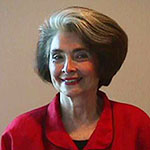Lois Cohen

Lois K. Cohen
Alumni Biography
Lois Cohen doesn’t understand the word retirement. She officially retired as Associate Director for International Health at the National Institute of Dental and Craniofacial Research at the National Institutes of Health in 2006, after 42 years of service as a research sociologist. But her work continues as an independent consultant in global health, and she serves as a Paul G. Rogers Ambassador for Global Health Research. She also works as a board member for the Alliance for Oral Health Across Borders and a number of other global organizations that promote health through oral health.
One of the most important projects in her career occurred during the Nixon administration in the late 1960s. “There were active discussions of what the U.S. health care system should look like to provide greater access to quality health care for all of our people,” she recalls. “Realizing that there were scant data on alternative models than what existed for the U.S. at the time, fee-for-service, I thought that the oral health care systems around the world might provide some constructive insights into lessons to be learned for the U.S. After all, oral care could be more easily measured than could general systemic health, for the mouth clearly displayed evidence of both disease and treatment.”
“It was possible to compare population oral health and care across systems in those countries that had working nationally-developed oral health systems for at least the previous 25 years. Each system differed structurally in terms of the characteristics of its workforce, its distribution, the working context and the financial arrangements, the priorities for delivery of care, prevention strategies, and so on. Those elements could be measured, yet no one had attempted to do that before,” she explains. “The impetus of our government’s need to know, and the desire of the World Health Organization’s wish to build evidence regarding effectiveness and efficiencies of the world’s health delivery systems, stimulated two large international collaborative studies involving more than ten industrialized countries.”
The studies were ground-breaking in their scope, merging research from oral epidemiology with social science and health services across culture. And according to Halfdan Mahler, M.D., the Director-General of the World Health Organization when the studies were published in 1985, they helped the global community see how oral health fit into a person’s overall health, rather than seeing it as a separate entity.
Purdue Influences
Having completed my undergraduate studies in sociology at the University of Pennsylvania where the areas of strength were then in demography and criminology, I took both my graduate degrees at Purdue's Sociology Department, where there were a broader range of subject areas available to students. Those areas that remained influential for me included the sociology of science (with Walter Hirsch) and the sociology of health care (with Robert Eichhorn in medical sociology and all his students on his grants from the federal government). Both areas were clearly germane to the career I actually pursued in the socio-dental sciences. Those professors remained lifelong friends and mentors for me and their work and teaching continue to inspire.
What was especially important at Purdue was a personalized and customized attention to a student’s needs. Faculty stayed connected with their graduate students post-graduation, facilitating networking and information-sharing for decades. I am forever grateful and owe these unselfish mentors much. Bob Eichhorn always told me that his legacy was his students and I continue to be honored to be part of that legacy. His students have become my colleagues, though we didn’t graduate together. We have the common ‘sociological’ education and imagination and that helps each of us to grow and to learn from each other even years after we have left Purdue.
Purdue Memories
The fact that the Purdue library was closed during home football games was a constant source of irritation for me and my husband. While he was an avid fan and loved the team, he understood my need to study in the library. He went to all the games, but in trying to drop me off at the library, we were thwarted by the policy, and even he was outraged that sports trumped an open library in those days. (Editor’s note: Cohen wondered if this was still a campus policy, and we assured her that it is not!)
Purdue Now
I haven’t been on campus since 1989, though I read all the newsletters and other communications I receive with great pride. Purdue's new president brings so much executive and political experience that the future augers even greater achievements by students, faculty, and alumni.
Greatest Achievement
My so-called “retirement years” have brought me great pleasure and even more learning experiences in related fields: consulting for international multinational agencies, universities, and professional associations in furthering global health, research, and education. The freedom to learn whatever comes my way is very exciting...something you cannot do when you have a more focused job description!
Person I Admire
Actually I am in awe of all the younger women with careers and family who are achieving a work–life balance that was less possible when I began my career. So many women have advanced to leadership positions in public policy; the physical, biologic, and social sciences; the humanities; the world of business; and the affairs of non-profit world that there are no limits for students who aspire to lead today. That to me is awesome!
Idea of Perfect Happiness
Living in a peaceful world and in a place where democratic government works!
What I’m Reading
A Guide for the Perplexed by Dara Horn, and The Flamethrowers by Rachel Kushner.
Profession I’d Like to Try
I’d love to be reborn as a talented visual artist or even a fashion designer! And I have always been torn, wanting to have gone into the Foreign Service.